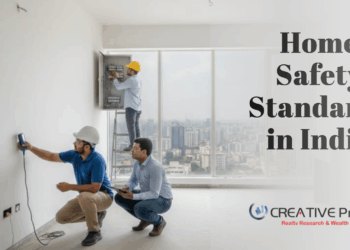Whether you’re buying a new flat, moving into a resale home, or leasing out a property, choosing the right home inspector is just as important as the inspection itself. With so many options available, searching “best home inspectors near me” might feel overwhelming—but finding a qualified local expert doesn’t have to be difficult.
Here’s how you can narrow your options and choose the best home inspection professional in your area.
Why Local Knowledge Matters
A home inspector who’s familiar with your area will:
- Understand region-specific issues (e.g., moisture problems in coastal areas, or foundation cracks in dry zones)
- Know common builder practices in your locality
- Be aware of local regulations or safety norms
- Reach the site quickly and be available for re-inspections if needed
Hiring locally isn’t just convenient—it adds accuracy and relevance to the inspection report.
 What Makes a Good Home Inspector?
What Makes a Good Home Inspector?
A professional home inspector should bring more than a checklist—they should bring expertise, integrity, and transparency. Look for someone who:
- Has relevant training and industry certifications
- Is detail-oriented and unbiased
- Explains findings clearly in person and in their reports
- Uses modern tools and methods for detection
- Offers post-inspection support or clarification
Certifications and Tools to Look For
Credibility matters. Reliable home inspectors are often:
- Certified by organizations like InterNACHI, ASHI, or Indian associations like HITA
- Equipped with tools like:
- Thermal imaging cameras
- Moisture meters
- Electrical testers
- Slope detectors
- Thermal imaging cameras
- Transparent about what their inspection includes and excludes
The use of technology often indicates the thoroughness of their evaluation.
Reading Reviews and Asking the Right Questions
Online reviews can reveal a lot. Look for:
- Detailed client testimonials, not just star ratings
- Before-and-after issue resolution stories
- Mentions of professionalism, punctuality, and clarity
Also, ask these questions before finalizing:
- How long will the inspection take?
- What will the report include?
- Can I attend the inspection?
- Do you offer re-inspections after repairs?
- What’s your experience with properties like mine?
Comparing Costs Without Compromising Quality
Home inspection costs can vary based on:
- Property size and type (flat, villa, bungalow)
- Age of the building
- Detail level of the inspection
- Local market competition
Avoid choosing the cheapest option blindly. Instead, evaluate the value offered—some pricier services may provide more detailed reports and better customer support.
Red Flags to Watch Out For
Avoid inspectors who:
- Hesitate to share a sample report
- Rush through the process or don’t allow you to attend
- Don’t offer written documentation
- Make repair offers (which can be a conflict of interest)
- Give vague or over-promising guarantees
Your inspector should be a neutral third party—not a fixer or seller in disguise.
Final Checklist Before You Hire
- Certified and experienced
- Familiar with local property types
- Positive, verifiable reviews
- Transparent pricing and scope
- Provides a detailed, photo-supported report
- Willing to walk you through findings
Tick these boxes, and you’re likely hiring the right home inspection professional.
Conclusion
Finding the best home inspector near you doesn’t have to be stressful. By focusing on local expertise, professional credentials, clear communication, and unbiased reporting, you can ensure your property purchase or rental is backed by the insights you need to make a confident decision.
Invest wisely—start with the right inspection expert.
FAQ
- Should I hire a local inspector even if I found a cheaper one from another city?
Yes. Local inspectors understand area-specific issues and are more accessible for follow-ups or urgent inspections. - Are online reviews reliable for choosing inspectors?
They help—but cross-check with references, sample reports, and direct communication to confirm credibility. - What should be included in a home inspection report?
Structural integrity, plumbing, electricals, waterproofing, ventilation, and any detected defects—with photos and severity levels. - Can I be present during the inspection?
Absolutely. A good inspector encourages your presence and explains the process as it unfolds. - Do home inspectors also fix the problems they find?
No. Ethical inspectors only report the issues—they should not be involved in repairs, to avoid conflict of interest.






